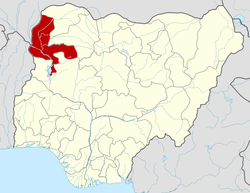INTRODUCTION
Kebbi State was created from the Southwestern half of Sokoto State. It borders the Niger Republic to the West and Benin Republic to the Southwest. The state shares borders with Sokoto and Zamfara to the North and East and Niger to the South. Birnin-Kebbi is its capital.
Kebbi is one of the seven states that form the North-West geopolitical zone of Nigeria.
LANDMASS, LOCATION, AND POPULATION
Kebbi State covers an area of 36,777 square kilometers. It lies at latitude 11°30’ North and longitude 4°00’ East. The state’s population is 3,256,541 (2006 census) 4,440,050 (2016 forecast) and a population density of 88. It accounts for 1.9% of Nigeria’s total population.
HISTORY AND PEOPLE
Kebbi State was created out of the old Sokoto State on 27 August 1991 by the military government of General Ibrahim Babangida. The major ethnic groups in the state include the Fulani, Hausa, Dakarki (Dakarawa), and Kamberi. There are 16 languages in the state; the most in the North-West geopolitical zone.
Islam is the main religion in Kebbi State. However, there are minority groups of Christians and traditional religion worshippers particularly in the southern part of the state.
MAIN TOWNS AND CITIES
Birnin-Kebbi (capital), Argungu, Zuru and Gwandu.
LOCAL GOVERNMENT AREAS
ADMINISTRATORS AND GOVERNORS
Patrick Aziza (Governor-Military): August 1991 - January 1992
Abubakar Musa (Governor – Civilian (National Republican Convention): January 1992 - November 1993
Salihu Tunde Bello (Administrator – Military): December 1993 - August 1996
John Ubah (Administrator – Military): August 1996 - August 1998
Samaila Bature Chamah (Administrator – Military): August 1998 - May 1999
Adamu Aliero (Governor - Civilian (All People’s Party/All Nigeria People’s Party): May 1999 - May 2007
Saidu Dakingari (Governor – Civilian (People’s Democratic Party): May 2007 - February 2012
Aminu Habib Jega (Acting Governor - Civilian (People’s Democratic Party): February 2012 - May 2012
Saidu Dakingari (Governor – Civilian (People’s Democratic Party): May 2012 - May 2015
Atiku Bagudu (Governor-Civilian (All Progressives Congress): May 2015- Present
ECONOMY AND EDUCATION
Sorghum
Agriculture is the most important economic activity in the state with riverine floodplains producing groundnut, cotton, and rice as cash crops. Subsistence crops include sorghum, millet, cowpeas, and onions. Much of the land in the state is used for grazing cattle, goats, and sheep.
The tertiary institutions in the state are Federal University, Birnin Kebbi; Kebbi State University, Waziri Umaru Federal Polytechnic, Birnin Kebbi; and Adamu Augie College of Education, Argungu.
FAMOUS SITES AND CULTURE
Sites
Kanta National Museum, Argungun
Kanta National Museum was formerly an emir’s palace but was converted to a museum in 1958. The museum houses artefacts and other historical relics on the town and its people.
Girmache Shrine, Zuru
Girmache Shrine in Zuru is a water shrine with hundreds of harmless crocodiles. The area is surrounded by sparse vegetation. The crocodiles are brought out around the time of the Zuru Uhola Festival when men dance carrying them on their back.
Karishi Traditional Settlement
Karishi Traditional Settlement is hilly community in Karishi, Sakaba local government area. It is protected from outsiders by fences and watchmen. The ruler of the community is seen just once a year and its inhabitants rarely leave the settlement.
Culture
The Argungun Fishing festival is a major cultural event in Kebbi .The annual festival goes on for four days. It began in 1934 as a festival to foster amiable relations between Kebbi Kingdom and the Sokoto Caliphate. The climax of the event is a fishing challenge at Matan Fada River where hundreds of potential fisherman jump into the river at once to fish and the fisherman with the largest catch gets rewarded.
The people of Zuhu Emirate celebrate the Uhola festival between December and January every year as thanksgiving. The highlight of the festival is the initiation of young boys and girls into adulthood.
NOTABLE INDIGENES
Prof. Abubakar Gwandu (1941 -2011)
Sarki Muhammad Kanta (first king of Kebbi; reign 1517 -1561)
DID YOU KNOW
The Kanta Museum in Argungu is where past emirs of Kebbi are buried.
KEBBI STATE IN PICTURES

